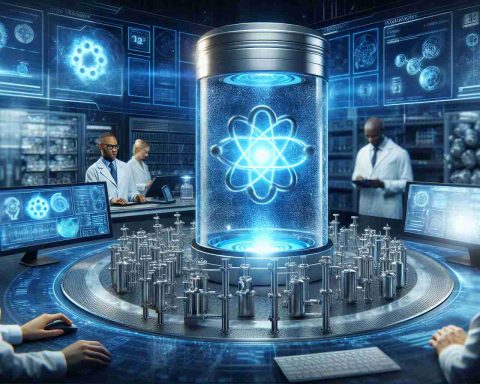The future of hydrogen storage is taking center stage as industries strive to harness renewable energy sources. A groundbreaking study delves into the potential for utilizing wind and solar power to produce hydrogen at a gigawatt scale. This process hinges on the effective storage and supply of hydrogen, especially during energy deficits.
A key focus of the study is the use of liquid organic hydrogen carriers (LOHCs) to store large quantities of hydrogen. Specifically, the research highlights the Toluene/Methylcyclohexane (TOL/MCH) system as a viable solution in areas where subsurface storage is limited.
Economic analyses reveal that the cost of hydrogen storage is not uniform across the United States. With a national median cost of $1.84 per kilogram of hydrogen, the financial implications vary regionally. The Midwest experiences negligible cost increases, whereas Central California and the Southeast face significant financial impacts. This geographic disparity emphasizes the need for region-specific strategies in hydrogen storage technology.
The TOL/MCH system emerges as a cost-effective storage option, yet it does not come without challenges. Initial capital investments, energy inefficiencies, reliance on critical materials, and greenhouse gas emissions are factors that demand attention. The technology’s dependence on pre-sulfided catalysts further complicates its deployment.
As industries pivot towards cleaner energy, ongoing research and innovation in hydrogen storage remain crucial. Addressing the outlined challenges will pave the way for more sustainable and economically feasible energy solutions across diverse geographical landscapes.
The Untold Impact of Hydrogen Storage on Global Economies and Innovation
As the world shifts towards renewable energy, hydrogen stands out as a potential game-changer. While much has been said about its production, the nuances of hydrogen storage remain less explored. The impact of hydrogen storage extends beyond technicalities, influencing economic landscapes, technological innovation, and geopolitical dynamics in unexpected ways.
Hydrogen Storage: A Hidden Enabler of Economic Transformation
One less-discussed but critical aspect of hydrogen storage is its potential to revolutionize local economies. Regions embracing hydrogen technology see a ripple effect across multiple sectors. For instance, the Midwest’s minimal cost increases for hydrogen storage could position it as a leader in hydrogen technology, attracting investments and creating jobs.
In contrast, areas like Central California and the Southeast with higher storage costs face challenges but also opportunities. Strategies to reduce these costs might spur innovation, encouraging local universities and startups to develop pioneering storage solutions. The resulting technological advances could not only alleviate regional economic pressures but also drive national competitiveness in the global hydrogen market.
Can Hydrogen Storage Drive Innovation in Other Industries?
Hydrogen storage innovation does not exist in a vacuum. It has the potential to drive breakthroughs in other fields, such as materials science, chemical engineering, and energy systems. Innovations born out of necessity, tackling challenges like energy inefficiencies and reliance on critical materials, may find applications in various other industries.
This cross-industry synergy is crucial for sustainable growth. As hydrogen storage solutions improve, they could catalyze advancements in other sectors, pushing boundaries and leading to the development of more efficient technologies across the board.
Geo-Strategic Implications: Hydrogen as a Catalyst for New Alliances?
The variabilities in hydrogen storage costs across different regions underscore its potential as a catalyst for new alliances. Countries and regions could form strategic partnerships, pooling resources to overcome mutual challenges. The cost-effective Toluene/Methylcyclohexane (TOL/MCH) system, despite its hurdles, could be shared technology, fostering international cooperation.
However, the reliance on critical materials and pre-sulfided catalysts highlights a potential geopolitical issue. The demand for these materials might shift global trade dynamics, making some countries pivotal players in the hydrogen economy. Thus, countries striving to become leaders in this space must also invest in sustainable material sourcing and recycling technologies.
Related Controversies: Environmental Concerns and Public Perception
Despite its promise, hydrogen storage and usage are not without controversies. Greenhouse gas emissions associated with the TOL/MCH system raise environmental concerns, demanding rigorous scrutiny and innovation to mitigate negative impacts. Public perception also plays a critical role; if communities do not view hydrogen as environmentally friendly, widespread adoption may be hindered.
Furthermore, stakeholders must address the environmental justice implications of hydrogen storage infrastructure. Ensuring that all communities, especially those historically disadvantaged, benefit from the hydrogen economy is paramount to its equitable growth.
Conclusions: The Bigger Picture of Hydrogen Storage
In conclusion, the future of hydrogen storage is more than a technical dilemma; it is a linchpin for economic transformation, innovation, and global cooperation. As we strive towards these ambitions, it’s crucial to balance technical breakthroughs with socioeconomic considerations, ensuring a sustainable and inclusive energy future.
For further insights into the dynamic world of hydrogen technology and its broader impacts, explore resources like U.S. Department of Energy and International Energy Agency.















